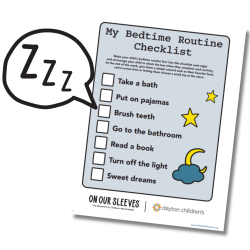how to parent a sleepy child
practical strategies for dealing with overtired kids

Scientists have found that there is a strong relationship between sleep habits and behavioral health problems. According to Dayton Children’s sleep medicine expert, Dr. Khalid Safi, research shows that not having enough sleep can lead to behavior and learning problems, hypertension, diabetes, obesity, and mental health problems. A lack of sleep can worsen our mental health and even lead to an onset of mental health symptoms. At the same time, an onset of mental health symptoms can lead to a lack of sleep!
A lack of sleep can negatively impact kid’s behavior by leading to behaviors like:
- Having less energy or become hyperactive
- Overreacting
- Impatience and trouble waiting
- Being less cooperative
- Whining
- Falling asleep during the day
- Having more meltdowns or tantrums over seemingly small situations
Since sleep and behavior are so closely linked, you might be wondering if your parenting approach needs to change when caring for a tired child. The On Our Sleeves experts understand that knowing how to parent a sleepy child can feel overwhelming at times.
“Sleep is so important to a child’s well-being because it influences how they manage stress and regulate their emotions. As a parent myself, I understand the challenge it is to help your child when they’re overly tired,” shares Emily Weitz, children’s mental health expert.
“understanding and addressing behaviors when your kid is overly tired with compassion not only nurtures your child’s rest but also adds to the supportive home environment you are creating.”
how do I parent a sleepy child?
Imagine this scenario:

It’s a school night, around 5:00 p.m. and you’re just getting home after leaving work and picking up your kids from school. One of your kids is tired because a bad dream woke them up multiple times through the night. This morning, this child had a hard time waking up, then almost fell asleep in the car on the way home. Now, they’re whining about bringing their backpack into the house and constantly asking about when dinner will be ready.
You assure them that dinner will be ready in about half an hour and ask them to start on their homework. Suddenly, you hear squabbling between this child and his siblings in the hallway! This is when you realize, the evening could be long and stressful if you don’t intervene now.
So, what should you do?
Let’s practice what we could do in this specific scenario. Here are some practical tips you could try:
- Simplify! Are you able to change your dinner plans? See if you could save the half hour dinner prep for another night and think of other options like mac and cheese, ramen, or Peanut Butter and Jelly. This way, you will save your own energy and have more left to pour into parenting your child.
- Lower your expectations: Asking them to bring their backpack inside from the car makes sense and should be done. But take a moment to think if there are any other chores and expectations of your child that can be saved for another day. For example:
- Can you help your child prioritize their homework tasks?
- Can you help them empty the dishwasher or even just do it yourself?
Lowering your expectations does not mean that the child gets a free pass for unacceptable behavior. For example, the fight in the hallway should be addressed. But you could suggest that the kids go to separate rooms and work on their own activities to help alleviate the fighting when they’re feeling tired and irritable.
- Provide support: When children are tired, they may have less patience and will need more support.
- Take some time to help your child with their homework or do a calming activity together. Even if they usually complete their homework on their own, try sitting with them while they complete it tonight.
- Get them involved in a calming activity like a puzzle or coloring.
- Use your best judgement about watching TV. Some kids might fall asleep watching it which will throw off their sleep schedule again. If you do let them watch TV, monitor them to ensure they don’t fall asleep.
- Avoid activities you know will get them excitable like video games.
- Get some fresh air: Going for a walk or riding bikes can help reset and give them something to do to make sure they won’t fall asleep too early.
- Start wind down time earlier: This can look like starting bath time early, reading extra books together, or having an older child go relax in their bed and look at books on their own. Audiobooks or calming music is also helpful. If you start your bedtime routine about a half hour earlier, this can help some kids decompress. Some kids may get more hyped up when they are overtired and might need extra time to calm down. Other kids may not need the extra time, but by starting the bedtime routine a half hour earlier, you won’t be messing up their sleep schedule if they do fall asleep early.
- Self-care! It can be exhausting for the parent as well when your child doesn’t get enough sleep. After you get them to bed, give yourself permission to relax yourself. Watch your comfort show or movie, read a book, or take a bubble bath.
what if this is an ongoing issue?
If your child is experiencing ongoing sleep disturbance or long term issues with sleep, consider these tips:
- Reach out to your pediatrician. There might be an underlying health condition contributing to their lack of sleep.
- Remember your routine: Try keeping to your routine and getting back on a normal sleep schedule.
- After a few days of staying up late, try to ease back into their normal bedtime and wake-up time. Keep bedtime and wake-up time close to the same on the weekends.
- Respond not react: Stay calm and simply respond (not react) to a tantrum if the child is upset. Encourage them to have a calm down period.
- Instead of saying “Stop crying and get over it!” or giving in to what they want, try: “I can see you are upset right now. It is not okay to yell and scream. I am going to ask you to take a deep breath and try to calm your body down. Then we will be able to talk about your feelings.”
- Set boundaries: Maintain boundaries and limits in a calm and consistent way
- You can say something like, “I hear you that you do not want to clean up your toys but that is what we need to do. If you chose to not pick up your toys, you will not be allowed to play with them after school tomorrow.”
- Compliment them for calming down.
- Try saying something like, “I like the way you were able to calm you body down. Now we can talk about next steps.”
- Take a pause: Try to find ways for them to catch-up on sleep even if it means saying “no” to other activities and events.
- You can share with them, “I can tell you are needing more sleep. We are going to move our family movie night to tomorrow so that we can catch up on sleep. This is not a punishment but just a way to help you be healthier.”
more resources for helping kids get good sleep

Making sure your child gets a good night’s sleep is super important for their mental health! At On Our Sleeves, we’re on a mission to help parents, caregivers, and caring adults like you with loads of free resources.
Start by downloading our Bedtime Routine Checklist and Bedtime Tickets—two practical tools packed with tips to make bedtime smoother and more restful. Just click the links below to get started on building a better sleep routine for your family.
keep the conversation going with On Our Sleeves
You can sign up for our monthly newsletter and get free expert tips, easy to use mental health tools, and early access to giveaways like our Activity Book and Conversation Starter Cards.
Fill out the form below to sign up today
Help us break the stigma around children’s mental health.
When you sign up for the On Our Sleeves movement, you’ll get free monthly emails with simple tips, expert advice, and activities you can use to support the kids in your life.
You’ll also get access to free downloadable resources and join a growing community working to break the stigma around mental health.
Fill out the form below to get started!
join the movement
Kids don’t wear their thoughts on their sleeves. Help us break the stigma and gives kids a voice. Join the movement for children’s mental health.
partner with us
Are you interested in partnering with Dayton Children’s On Our Sleeves to help spread the movement for children’s mental health? Send us a message and we will be in touch!
care that goes above and beyond
Because every child deserves care that goes above and beyond, Dayton Children’s provides compassionate, expert care for kids of all ages. Find a provider, schedule an appointment, or learn more about conditions we treat today.




